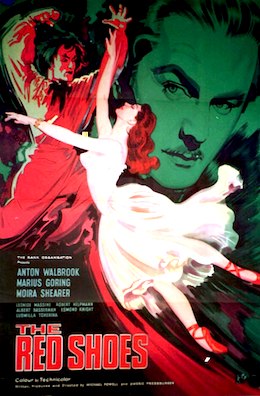
The Red Shoes is a 1948 British drama film written, directed, and produced by Michael Powell and Emeric Pressburger. It follows Victoria Page, an aspiring ballerina who joins the world-renowned Ballet Lermontov, owned and operated by Boris Lermontov, who tests her dedication to the ballet by making her choose between her career and her romance with composer Julian Craster.

Sir Alexander Korda was a Hungarian–born British film director, producer, and screenwriter, who founded his own film production studios and film distribution company.

Corinne Griffith was an American film actress, producer, author and businesswoman. Dubbed "The Orchid Lady of the Screen," she was widely regarded as one of the most beautiful actresses of the silent film era. In addition to her beauty, Griffith achieved critical recognition for her performance in Frank Lloyd's The Divine Lady (1929), which earned her a nomination for the Academy Award for Best Actress.

Twentieth Century is a 1934 American pre-Code screwball comedy film directed by Howard Hawks and starring John Barrymore and Carole Lombard. Much of the film is set on the 20th Century Limited train as it travels from Chicago to New York City. Ben Hecht and Charles MacArthur adapted their 1932 Broadway play of the same name – itself based on the unproduced play Napoleon of Broadway by Charles Bruce Millholland – with uncredited contributions from Gene Fowler and Preston Sturges.
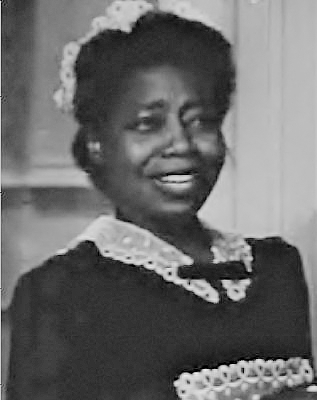
Butterfly McQueen was an American actress. Originally a dancer, McQueen first appeared in films as "Prissy" in Gone with the Wind (1939). She also appeared in the films Cabin in the Sky (1943), Mildred Pierce (1944), and Duel in the Sun (1946).

Ralph Forbes was an English film and stage actor active in Britain and the United States.

The Divorce of Lady X is a 1938 British Technicolor romantic comedy film produced by London Films; it stars Merle Oberon, Laurence Olivier, Ralph Richardson and Binnie Barnes. It was directed by Tim Whelan and produced by Alexander Korda from a screenplay by Ian Dalrymple and Arthur Wimperis, adapted by Lajos Bíró from the play Counsel's Opinion by Gilbert Wakefield. The music score was by Miklós Rózsa and Lionel Salter and the cinematography by Harry Stradling.
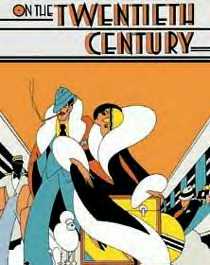
On the Twentieth Century is a musical with book and lyrics by Betty Comden and Adolph Green and music by Cy Coleman. Based partly on the 1932 play Twentieth Century and its 1934 film adaptation, the musical is part operetta, part farce and part screwball comedy. The story involves the behind-the-scenes relationship between Lily, a temperamental actress and Oscar, a bankrupt theatre producer. On a luxury train traveling from Chicago to New York in the early 1930s, Oscar tries to cajole the glamorous Hollywood star into playing the lead in his new, but not-yet-written drama, and perhaps to rekindle their romance.

John Loder was established as a British film actor in Germany and Britain before migrating to the United States in 1928 for work in the new talkies. He worked in Hollywood for two periods, becoming an American citizen in 1947. After living also in Argentina, he became a naturalized British citizen in 1959.

Of Human Bondage is a 1946 American drama film directed by Edmund Goulding and starring Paul Henreid, Eleanor Parker and Alexis Smith. The second screen adaptation of W. Somerset Maugham's 1915 novel, this Warner Bros. sanitized version was written by Catherine Turney. The central characters are Philip Carey, a clubfooted medical student, and Mildred Rogers, a low-class waitress with whom he becomes obsessed.
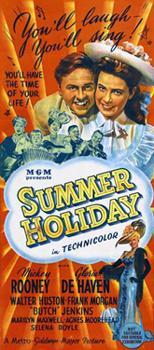
Summer Holiday is a 1948 American musical-comedy film, directed by Rouben Mamoulian and starring Mickey Rooney and Gloria DeHaven. The picture is based on the play Ah, Wilderness! (1933) by Eugene O'Neill, which had been filmed under that name by MGM in 1935 with Rooney in a much smaller role, as the younger brother. Though completed in October 1946, this film sat on the shelf until 1948.
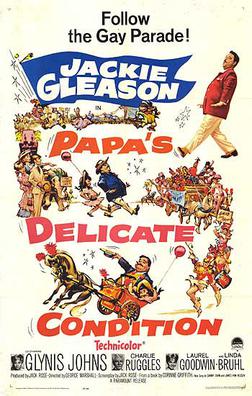
Papa's Delicate Condition is a 1963 American comedy film starring Jackie Gleason and Glynis Johns. It was an adaptation of the Corinne Griffith memoir of the same name, about her father and growing up in Texarkana, Texas. Jimmy Van Heusen (music) and Sammy Cahn (lyrics) won an Academy Award for Best Original Song for "Call Me Irresponsible".

Black Swan is a 2010 American psychological horror film directed by Darren Aronofsky from a screenplay by Mark Heyman, John McLaughlin, and Andres Heinz, based on a story by Heinz. The film stars Natalie Portman in the lead role, with Vincent Cassel, Mila Kunis, Barbara Hershey, and Winona Ryder in supporting roles. The plot revolves around a production of Tchaikovsky's Swan Lake by the company of New York City Ballet. The production requires a ballerina to play the innocent and fragile White Swan, for which the committed dancer Nina Sayers (Portman) is a perfect fit, as well as the dark and sensual Black Swan, which are qualities better embodied by the new rival Lily (Kunis). Nina is overwhelmed by a feeling of immense pressure when she finds herself competing for the role, causing her to lose her tenuous grip on reality and descend into madness.

Counsel's Opinion is a 1933 British romantic comedy film starring Henry Kendall and Binnie Barnes. It was one of three films directed in Britain in the early 1930s by Canadian-American Allan Dwan and was an early production from Alexander Korda's London Films. Counsel's Opinion was based on a 1931 Gilbert Wakefield play and was remade, again by London Films, in 1938 as The Divorce of Lady X starring Laurence Olivier and Merle Oberon.
Brenda Forbes was a British-born American actress of stage and screen.

Déclassée, listed as Déclassé on some posters, is a 1925 American silent drama film of manners produced and released by First National Pictures in association with Corinne Griffith as executive producer. Griffith also stars in the production which was directed by Robert G. Vignola and based on the 1919 play by Zoë Akins that starred Ethel Barrymore.

The Unknown Tomorrow is a 1923 German silent drama film directed by Alexander Korda and starring Werner Krauss, María Corda, and Olga Limburg.

The Squall is a 1929 American pre-Code drama film directed by Alexander Korda and starring Myrna Loy, Richard Tucker, Alice Joyce and Loretta Young, and based on the 1926 play The Squall by Jean Bart.

Her Private Life is a surviving 1929 American pre-Code drama film directed by Alexander Korda and starring Billie Dove, Walter Pidgeon and Holmes Herbert. The plot concerns an English aristocrat who causes a scandal when she divorces her husband and runs off with a young American. The film had been considered a lost film. However, in July 2016, according to the Library of Congress, the film was found in an Italian archive.

Lilies of the Field is a 1924 American silent drama film directed by John Francis Dillon, produced by and starring actress Corinne Griffith, and distributed by Associated First National Pictures. It is based on a 1921 play, Lilies of the Field, by William J. Hurlbut. The film was remade by Griffith as an early sound film in 1930.


















